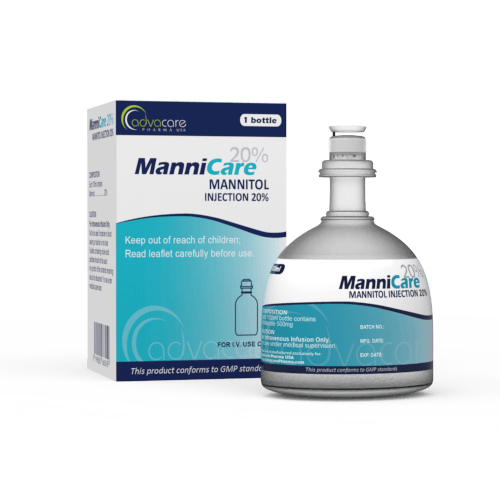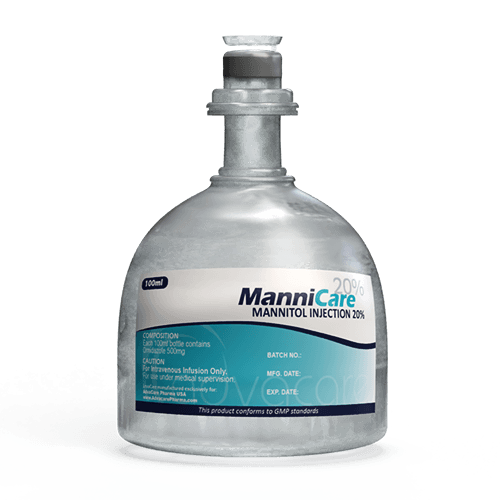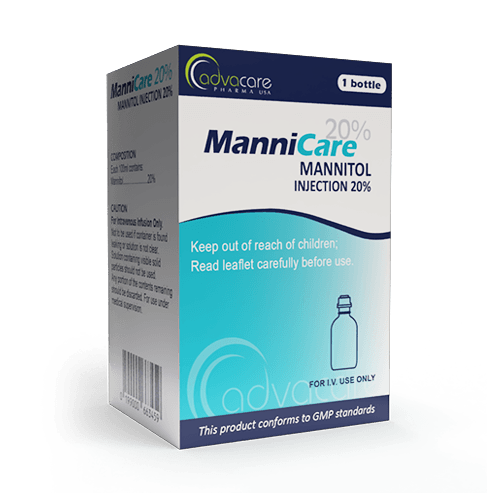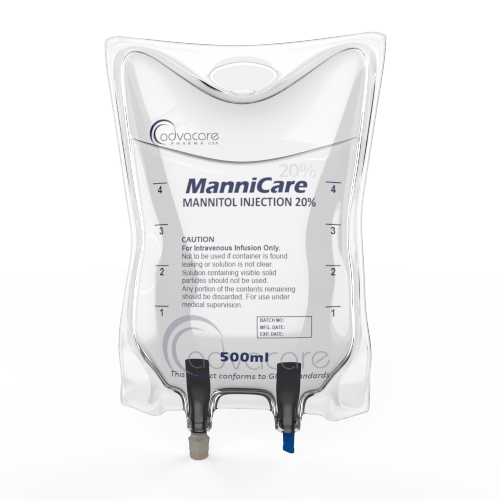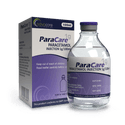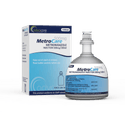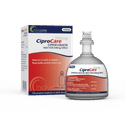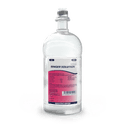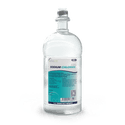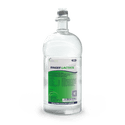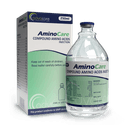- Home›
- Pharmaceuticals›
- Injections›
- Large Volume Injections›
- Mannitol Injection
Mannitol Injection
Dosage
Packaging
What is Mannitol?
Active Ingredients: Mannitol
Mannitol is used to promote diuresis and reduce intracranial and intraocular pressure. This medication is indicated for the treatment of cerebral edema caused by neoplasms or trauma, dialysis disequilibrium syndrome, and the oliguric phase of acute renal failure. It also promotes the urinary excretion of toxic materials.
Mannitol is classified as an osmotic diuretic. It works by drawing water out of tissues, which decreases swelling.
When administered intravenously, this medicament has an osmotic diuretic effect as a solute with a relatively small molecular size, to the extracellular space. Mannitol inhibits the reabsorption of water in the tubules and enhances the excretion of sodium and chloride by increasing the osmolarity of the glomerular filtrate. This elevation in extracellular osmolarity, resulting from the intravenous administration of mannitol, stimulates the movement of intracellular water to the extracellular and vascular spaces. This is the mechanism of mannitol that can cause reduced intracranial pressure, intracranial edema, and intraocular pressure.
After intravenous administration, mannitol is distributed to the extracellular space within 20 to 40 minutes. Its volume of distribution in adults is approximately 17L. In patients with normal renal function, the total clearance of mannitol ranges from 87 to 109mL/minute. The elimination half-life of mannitol is between 0.5 to 2.5 hours. The metabolism of this medication is minimal after intravenous administration to healthy subjects. This medicament is primarily eliminated unchanged by the kidneys. It is filtered by the glomeruli, with less than 10% of tubular reabsorption, and no secretion by tubular cells. Approximately 80% of an administered dose of mannitol is excreted in the urine within 3 hours after intravenous administration.
This injection has been manufactured as a sterile, single-dose container for intravenous administration.
This product is also available in an injection form in combination with Glycerin.
AdvaCare Pharma is a global supplier of Mannitol Injections. AdvaCare excels at the production of high-quality yet cost-effective treatments. This medication is manufactured in our GMP-certified facilities located in China, India, and the USA.
Why are we a quality Mannitol manufacturer?
AdvaCare Pharma is a leading manufacturer of Mannitol Injection. For 20 years, we have been in the business of manufacturing GMP-approved high-quality, affordable pharmaceutical injection products to improve healthcare worldwide. Our control of the supply chain is data-driven and methodical, supported by highly skilled teams of professionals.
As a large-scale Mannitol manufacturer, we supply pharmaceutical distributors, hospitals, pharmacies and other medical organizations in more than 65 countries.
Uses
What is Mannitol used for?
It is used in the treatment of acute renal failure, in the promotion of diuresis, and in the reduction of intracranial pressure and brain mass. It is also used to reduce high intraocular pressure and promotes the urinary excretion of toxic materials.
How should Mannitol Injection be used?
This medication is manufactured as a solution, which should only be administered by a doctor or healthcare provider. This medication is only for intravenous application, it is mostly administered into a large central vein.
What dose should be given?
Adult Dosing Dosage may vary based on different medical indications:
- For cerebral edema, the usual dose for adults is 0.25-2g/kg as a 15-20% solution. This medicine should be administered over at least 30 min with at least 6-8 hours between repeat treatments.
- For treating oliguria, a renal function test dose prior to initiating the treatment: 0.2g/kg IV over 3 to 5 min resulting in a urine flow of at least 30 to 50 mL/hr.
- For treating intracranial pressure, the recommended dose is 0.25g/kg infused intravenously over 30 minutes, which may be repeated every six to eight hours.
- For treating intraocular pressure, the recommended dosage is 1.5 to 2g/kg of a 20% solution (7.5 to 10ml/kg) as a single dose infused intravenously over a period of at least 30 minutes.
- For treatment of oliguria during cardiovascular and other types of surgery, the recommended dosage is 50 to 100g IV. usually, a 5, 10, or 20% solution is used depending on the fluid requirements of the patient.
Pediatric Dosing This medication is approved for pediatric patients to reduce intracranial and intraocular pressure. There are no significant studies that confirm the optimal dose of mannitol injection. The doses are similar to adults but need to be adjusted by healthcare professionals.
Pediatric patients who are less than two years of age (preterm and term neonates) are at higher risk for fluid and electrolyte abnormalities.
Renal Dosing In patients with renal impairment, the treatment should not start until renal function and urinary output have been confirmed to be adequate. Mannitol is not recommended for patients with established anuria caused by acute renal failure. In cases of severe renal impairment, a test dose should be administered. During mannitol infusion, urine output should be closely monitored. If urine output decreases, the treatment with mannitol should be discontinued.
Hepatic Dosing There are no defined guidelines for patients with hepatic impairment.
Refer to a doctor or pharmacist for guidelines on dosage. Do not exceed what they advise.
Who can use Mannitol Injection?
Mannitol is mainly used for the reduction of intracranial pressure, treatment of cerebral edema, and elevated intraocular pressure. Special caution should be considered in some groups of patients.
Pregnant Mannitol does not cause major birth defects, miscarriages, or adverse outcomes for either the mother or the fetus. Mannitol can cross the placenta and can potentially lead to fluid shifts, but no adverse developmental effects have been reported in animal studies. Fetal ewes can experience fluid shifts in response to maternal mannitol infusion.
The risk of major birth defects and miscarriage for women using mannitol during pregnancy is unknown and all pregnancies have a risk of birth defects, loss, or other adverse outcomes.
Nursing There is no information available regarding the presence of mannitol in human or animal milk, its effects on breastfed infants, or its impact on milk production. Healthcare providers should outweigh the developmental and health benefits of breastfeeding against the clinical necessity for the medication and any potential adverse effects on the breastfeeding child.
Pediatric The medication is approved for pediatric patients but the doses are not well-confirmed. Usually, pediatric patients receive doses based on their health condition and their weight. Preterm and term neonates are at increased risk for fluid and electrolyte abnormalities due to the decreased glomerular filtration rate and the limitation to concentrate urine.
Geriatric This medicament is excreted by the kidney and the risk of it is higher in the older population, especially at those with impaired renal function. The patient’s renal, cardiac, and pulmonary health status needs to be evaluated before administering Mannitol.
Patients with renal impairments have a prolonged elimination half-life of mannitol. The elimination half-life of mannitol is estimated to be approximately 36 hours, as determined by serum osmolarity measurements. In patients with renal impairment undergoing dialysis, the elimination half-life of mannitol is reduced to 6 hours during hemodialysis and 21 hours during peritoneal dialysis.
What should be done in case of Mannitol overdosage?
The most common signs of overdose due to Mannitol injection include renal failure, acute kidney injury, hypo or hypervolemia, hyperosmolarity, electrolyte imbalance, CNS toxicity, coma, or seizures. This condition needs to be managed symptomatically. The drug should be discontinued, and corrective measures should be taken. Hemodialysis can also help in the elimination of the drug.
How should this injection be stored?
Mannitol should be stored at room temperature and should be protected from excessive heat and freezing.
Other warnings
If patients experience hypersensitive reactions, this medication should be discontinued. This includes dyspnea, cardiac arrest, and hypotension.
Patients with renal impairments have an increased risk of side effects if being treated with Mannitol.
Mannitol might cause CNS toxicity manifesting with symptoms such as confusion, lethargy, or coma due to high serum mannitol concentrations.
Adverse reactions like irritation and phlebitis can occur at the infusion site.
High concentrations of mannitol might cause false low results of inorganic phosphorus.
Side Effects
As with all pharmaceuticals, some unwanted effects can occur from the use of Mannitol Injection.
Common side effects include, but may not be limited to:
- bone or muscle stiffness
- malaise
- pain or swelling in the joints
- weakness
- itching at the site of injection
Serious side effects may include:
- signs of an allergic reaction
- unusual swelling or rapid weight gain
- changes in urination
- shortness of breath
- seizures
For a comprehensive understanding of all potential side effects, consult a medical professional.
If any symptoms persist or worsen, or you notice any other symptoms, please call your doctor immediately.
Precautions
Do NOT use Mannitol Injection if:
- You are hypersensitive to any of the ingredients.
- You have renal damage or dysfunction.
- You have heart failure.
- You have pulmonary congestion.
Before treatment, consult your doctor regarding any medications you are taking to address potential drug interactions.
This medication may not be suitable for people with certain conditions, so it is important to consult with a doctor if you have any health conditions.
Patients who are pregnant, planning to get pregnant, or breastfeeding should inform their doctors before taking this medication.
References
Clinical Study on Mannitol Infusion on the Increased Intracranial Pressure Patients
This is a clinical experimental study that evaluates the effects after infusion of 15% mannitol intravenously. It included 20 patients who were administered 1.5-2g per kg of body weight.
The results showed changes in pulse rate and blood pressure, urine output, and urine specific gravity at 15 minutes, 30 minutes, 45 minutes, 60 minutes, 120 minutes, 180 minutes, 240 minutes, 300 minutes, and 360 minutes after completion of mannitol infusion.
The results showed that urine output in 6 hours was 1368cc on average, of which 70% was excreted within three hours. The results also showed that the blood pressure was decreased.
The conclusion of this study is that mannitol is a safe and efficacious diuretic in patients with increased intracranial pressure.

You might be interested in...
Why AdvaCare Pharma?
As an industry leader, we are aware of our responsibility to provide affordable and sustainable solutions to improve healthcare worldwide.
